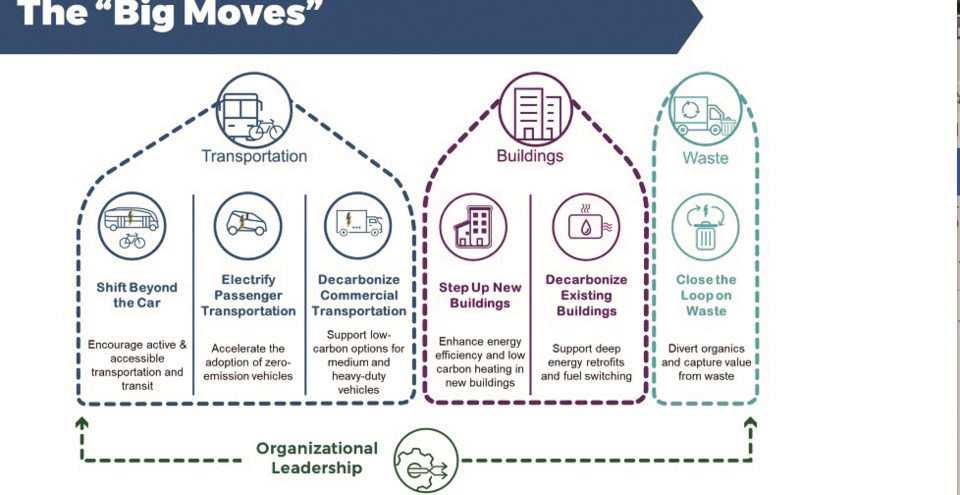Pemberton residents got their first glimpse of a new Community Climate Action Plan during a public information session last week.
Hosted by the Community Energy Association (CEA), a non-profit agency the Village of Pemberton (VOP) hired to help develop the plan, it presented the first stages of the plan via a Zoom workshop April 8.
“[The Intergovernmental Panel on Climate Change] determined that we need to reduce our emissions by 45 per cent by 2030 and we need to reduce our emissions by 100 per cent, or achieve net-zero emissions, by 2050,” said the CEA’s Alison Jenkins. “It sounds like a pretty tall order, but we’re going to talk about some of the things we can do to work towards those goals.”
To that end, the plan will focus on climate change mitigation—which means reducing greenhouse gas emissions to help limit the impact of climate change—rather than climate change adaptation. It will also look at reducing territorial-based greenhouse gas emissions, which includes things like emissions from buildings, transportation and organic waste in the landfill—rather than consumptive-based emissions. Finally, it also focuses on community actions like green infrastructure, policies, and outreach. There will also be some focus on how the VOP can show leadership within its own operations.
The presentation also broke down Pemberton’s current emissions. Passenger vehicles and commercial vehicles combined produce between 85 and 90 per cent of Pemberton’s greenhouse gas emissions, according to 2018 data, the most recent available.
“In total in 2018 Pemberton emitted close to 23,000 tons of carbon dioxide equivalent,” Jenkins said. “And the community spent almost $15 million on energy. So that’s money being spent filling up your cars at the gas station, filling up with gasoline and diesel. That’s the money you spent on electricity to heat your home and so on. And that’s money that largely leaves the community.”
However, even if nothing changes, emissions from passenger vehicles in Pemberton are expected to decline by 2050 because the province has put a zero emissions vehicle act into place.
Jenkins also pointed out that the community has already taken some important climate action steps like implementing Step 4 of the Energy Step Code on Jan. 1 this year. It also applied with Whistler, Squamish, and the Lil’wat Nation to fund a Sea to Sky EV charging network, and recently completed both a bike-network plan for the village, and a downtown revitalization project that features green stormwater management infrastructure.
In that vein, Jenkins also applauded the effort of Pemberton Secondary students for a recent petition.
“There’s certain things they’re asking for, which included improved transportation in and out of the community—the students of Pemberton Secondary School should get bus passes [the petition says],” she said.
Jenkins also recognized the students’ suggestions for: an educational campaign to get citizens to waste less food, buy more locally grown produce, put up water bottle stations around the town, ensure that no old-growth forest is logged in the community, lobby the provincial government for old-growth protection, and put more recycling bins around town.
Along with feedback from the students, earlier this year, the CEA hosted stakeholder workshops where different community groups, in part, envisioned a low-carbon future—in particular 2040—with regards to buildings, transportation, and waste.
Those are the three sectors that make up the plan’s “Big Moves.” Under transportation, there’s shift beyond the car, encouraging active and accessible transportation and transit, electrifying passenger transportation, and decarbonizing commercial transportation.
Under buildings, changes would include improving new buildings with enhanced efficiency and low-carbon heating, as well as decarbonizing existing buildings, supporting deep-energy retrofits and fuel switching.
Finally, under waste, the goal is to divert organics and capture value from waste.
“If Pemberton didn’t do anything and didn’t implement these actions, then they wouldn’t reach this 2030 target, they wouldn’t be on track in 2030 to reach net zero,” Jenkins said. “But if Pemberton does implement these ‘Big Moves’ and the actions associated with them, they can get down to where they need to be in 2030 … So that’s really promising.”
The VOP’s Committee of the Whole saw the presentation on April 13.
“I’m really excited about this,” Pemberton Mayor Mike Richman said afterwards. “I’m really excited to see this get into play.”
Meanwhile, residents are invited to view the plan and weigh in with a survey over the next several weeks at haveyoursay.pemberton.ca/climate-action-plan.




